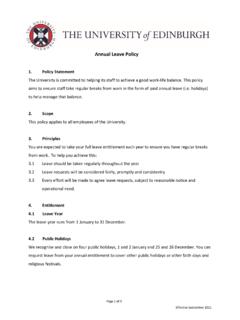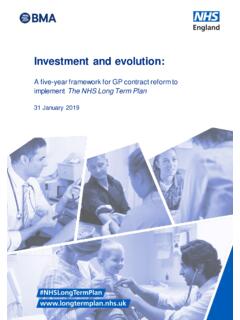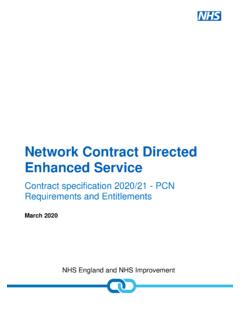Transcription of Early years entitlements: operational guidance - GOV.UK
1 Early years entitlements: operational guidance For local authorities and providers June 2018 Contents Introduction 4 Summary 4 Who is this publication for? 4 Main points 5 What are the main changes to the guidance ? 5 30 Hours Free Childcare (the Extended entitlement ) 6 Summary 6 Application Process 6 Digital Childcare Service 7 When a parent loses eligibility 13 Extending 30 hours to Children in Foster Care 17 Introduction 17 Key Considerations 17 Process 18 Appeals Process 22 Transition Arrangements for September 2018 22 Delivery models and flexibility 23 Summary 23 Minimum Requirements of Sessions 23 Flexible Models 24 Childminders 26 Schools 27 Does Early years provision in a school need to be registered with Ofsted? 28 Partnership working 31 Charging 33 Summary 33 Meals, consumables and additional activities 33 Access to free places 33 Written agreement 34 Deposits 34 On-call services 34 SEND 35 Summary 35 Education, Health and Care plans 37 Case studies 37 School Census and Early years Census 38 Summary 38 Legislation 38 Changes to data collection 38 Children splitting provision between providers 39 The January census and calculation of the Dedicated Schools Grant 39 Annex A: Application Form Template 41 Introduction The purpose of this guidance is to help local authorities and providers understand in more detail the Department for Education s (DfE) expectations about how the free entitlements for two-, three- and four- year -olds should be delivered.
2 The guidance applies to the: 15 hour entitlement for the most disadvantaged two- year - olds: 15 hour entitlement for parents of three- and four- year -olds (the universal entitlement ); and 30 hour entitlement for working parents of three- and four- year -olds (the extended entitlement ). We would like to thank the many providers, local authorities and sector organisations that have supported the production of this guidance . There are case studies and additional supporting tools which can be found on the Childcare Works website. Summary This publication provides operational guidance from the DfE. Local authorities must have regard to this guidance when discharging their duties to secure free Early years provision. They should not depart from it unless they have good reason to do so. This guidance should be read alongside the statutory guidance for local authorities on the provision of Early education and childcare.
3 The operational guidance also includes examples of practice which do not constitute guidance but which might assist local authorities in setting up appropriate arrangements to meet their legal duties related to the free entitlements. Who is this publication for? This guidance is for: Local authorities Early years providers who are delivering the free entitlements. These are referred to as providers throughout the document and include: Early years providers and childminders registered on the Ofsted Early years Register; childminders registered with a childminder agency that is registered with Ofsted schools taking children age two and over that are exempt from registration with Ofsted as an Early years provider. Main points This guidance seeks to assist local authorities and providers through examples and further information, supporting greater consistency across the country by making clear: what local authorities should do to fulfil their statutory responsibilities what providers should do to fulfil their agreement with the local authority what local authorities and providers may wish to do to support parents and children What are the main changes to the guidance ?
4 The main change is the introduction of a section covering the extension of 30 hours to children in foster care. As part of our process of continuous improvement, we have re-ordered and clarified the text throughout the guidance following feedback from local authorities and providers. 30 Hours Free Childcare (the Extended entitlement ) Summary Summary of the end-to-end application process: Parents apply through the digital childcare service, or in some circumstances, by phone using the childcare service helpline. If their application is successful, they are given an 11-digit eligibility code (usually beginning 500 ). Foster parents will apply directly to their responsible local authority (see page 17) Parents take their eligibility code to a provider for verification, together with their National Insurance number and child s date of birth. The provider verifies the code through their local authority either by phone or email, or through a provider portal linked to the local authority system.
5 The local authority verifies the code through DfE s Eligibility Checking System (ECS). Local authorities should audit the eligibility codes at six points in the year to identify children who have fallen out of eligibility. Parents will be prompted every three months to reconfirm that they remain eligible. If they are no longer eligible for 30 hours, and their child is already in a 30 hours place, they will enter a grace period and will be able to retain their place for a short period. Parents are only legally entitled to start claiming a 30 hours place for their three or four year old the term following the date they receive a decision from HMRC. Therefore, they should be encouraged to apply well before the deadlines. Providers will need to verify the code before a child take up their place. Application Process Parents must apply for 30 hours free childcare through the digital childcare service not through their local authority or provider.
6 HMRC is responsible for checking whether a parent is eligible and issuing an eligibility code. The only exception is for foster parents of children in foster care (see page 17). Parents wanting only to claim the universal 15 hours entitlement should do so via their provider and local authority and not through the digital childcare service. Parents need to check with their childcare provider or local authority whether their two year old is eligible for a free 15 hour place. In contrast to the universal entitlement (which only has an age criterion), for 30 hours free childcare, parents also need to meet a set of eligibility requirements ( income requirements). A child will be entitled to the additional free hours from the term after both of the following conditions are satisfied: (1) the child has attained the age of three; (2) the child s parent has a current positive determination of eligibility from HMRC a valid 30 hours eligibility code.
7 Parents can check online whether they could be eligible for a range of government childcare offers, including 30 hours, via Childcare Choices or the Childcare Calculator. Those who could be eligible for 30 hours and/or Tax-Free Childcare will be directed to the digital childcare service to apply. The eligibility criteria for 30 hours and Tax-Free Childcare are broadly aligned. For a more detailed guide to the 30 hours eligibility criteria see our guide. Parents are able to apply for both 30 hours and Tax-Free Childcare at the same time by entering their details once. HMRC checks parents eligibility for both schemes at the same time. What can local authorities and providers do to help? Direct parents to Childcare Choices and the Childcare Calculator to learn more about which offers might be best for them, whether they are likely to be eligible and how to apply. Local authorities and providers should encourage parents to apply well in advance of deadlines.
8 Local authorities are encouraged to utilise the communications products that the Department issues to support this messaging Providers should encourage parents to bring in their code as soon as they receive it, along with their National Insurance number and the child s date of birth Local authorities should encourage providers to verify parent codes as rapidly as possible. Local authorities should remind providers that a parent cannot take up their 30 hours place until the code has been verified. Reassure parents who do not want to use Tax-Free Childcare that they should still apply for 30 hours via the digital childcare service. If they are receiving financial support through tax credits and childcare vouchers and only want to take up 30 hours, they can choose not to apply for Tax-Free Childcare (and keep their tax credits) as part of the application. Remind parents that they can use Tax-Free Childcare alongside 30 hours to pay for additional childcare costs outside of the free entitlement , for example, during the school summer holidays.
9 Tell parents they do not need to apply via the childcare service if they only want the universal 15 hours entitlement for 3 and 4 year olds or the 2 year old offer Remind parents that they need to reconfirm every three months. The date for when to do this is in a parent s childcare account. Digital Childcare Service Parents should apply via the childcare service, unless they are applying for a child in foster care (see page 17). They will be asked to: 1. Create a Government Gateway account if they do not already have one. If they do, they will need to sign into Government Gateway to verify their identity before accessing the childcare service. Parents can find details and instructions on how to register for a Government Gateway account at 2. Once in the childcare service, enter their personal details including their name, address and National Insurance number and the same details for their partner (if they have one).
10 3. Declare that they expect to meet the income requirements over the coming three months. 4. Declare whether they are in receipt of any relevant benefits. Having completed their application, if eligible, parents will: 5. Have a childcare account. In the secure messages section of their account, parents will receive messages regarding their eligibility. 6. Be given an 11 digit eligibility code for their child this can be found in the 30 hours free childcare section of their childcare service account and in their secure messages section. These codes normally start with 500 . However, there are a small number of cases where parents might have a temporary code starting with 11 . Temporary codes are issued manually, outside of the childcare service. 7. Be asked to take this code (along with their National Insurance number and child s date of birth) to their provider to reserve their 30 hours place. Parents who need assistance to apply, or who do not have access to the internet, can call the childcare service helpline on 0300 123 4097 and apply over the phone.















